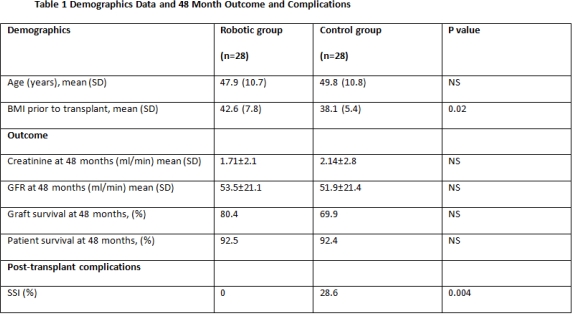Robotic Kidney Transplantation in Obese Recipients Can Lead to Superior Outcomes in Terms of Wound Infection and Graft Survival – 48 Months of Follow-up.
Surgery, University of Illinois, Chicago, IL.
Meeting: 2016 American Transplant Congress
Abstract number: C237
Keywords: Graft function, Infection, Kidney transplantation, Survival
Session Information
Session Name: Poster Session C: Poster Session 1: Kidney Complications-Other
Session Type: Poster Session
Date: Monday, June 13, 2016
Session Time: 6:00pm-7:00pm
 Presentation Time: 6:00pm-7:00pm
Presentation Time: 6:00pm-7:00pm
Location: Halls C&D
Introduction: Traditionally kidney transplantation (KT) in obese recipients has been associated with high rates of surgical site infections (SSI). We hypothesize that robotic kidney transplantation (RKT) in obese individuals could decrease the rate of SSI and improve long-term outcomes.
Patients and Methods: From June 2009 to November 2015, 170 obese patients with ESRD underwent RKT at our institution. In a cohort study, the first 28 patients who achieved a follow-up period of 48 months were frequency matched with a control group of 28 morbidly obese patients who underwent standard open KT prior to June 2009.
Results: The mean BMI was 42.6±7.8 kg/m2 in the robotic group and 38.1±5.4 kg/m2 in the control group (p=0.02). No statistically significant differences between the two groups were noted in relation to pre-transplant comorbidities, etiology of ESRD, cold ischemia time, warm ischemia time, blood loss, intraoperative blood transfusion, immunosuppressive medications and hospital stay. At 48 months, the GFR was 51.5±30.7 ml/min/1.73m2 in the robotic group and 51.9±21.8 ml/min/1.73m2 in the control group (p=0.83). The rate of SSI was significantly higher in the control group when compared with the robotic group (28.6% vs. 0%, p=0.004). At 4-years post-transplant, 8 patients in the control group (28.6%) experienced graft loss when compared with five patients in the robotic group (17.9%). Three (37.5%) out of the eight patients who lost the graft in the control group had concomitant SSI. The patient survival at 48 months was 92.5% in the robotic group and 92.4% in the control group (p=0.97) (Table 1).
Conclusions: Our preliminary experience has demonstrated the benefit of RKT in obese recipients in terms of SSI and graft survival. We strongly believe that this minimally invasive approach in obese recipients can lead to the same kidney transplant success rates as in patients with a normal BMI.

CITATION INFORMATION: Tvetanov I, Garcia Aroz S, Spaggiari M, Hoonbae J, Oberholzer J, Benedetti E. Robotic Kidney Transplantation in Obese Recipients Can Lead to Superior Outcomes in Terms of Wound Infection and Graft Survival – 48 Months of Follow-up. Am J Transplant. 2016;16 (suppl 3).
To cite this abstract in AMA style:
Tvetanov I, Aroz SGarcia, Spaggiari M, Hoonbae J, Oberholzer J, Benedetti E. Robotic Kidney Transplantation in Obese Recipients Can Lead to Superior Outcomes in Terms of Wound Infection and Graft Survival – 48 Months of Follow-up. [abstract]. Am J Transplant. 2016; 16 (suppl 3). https://atcmeetingabstracts.com/abstract/robotic-kidney-transplantation-in-obese-recipients-can-lead-to-superior-outcomes-in-terms-of-wound-infection-and-graft-survival-48-months-of-follow-up/. Accessed February 16, 2026.« Back to 2016 American Transplant Congress
